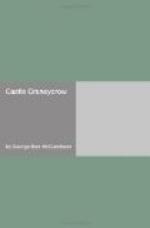Then she came to the paragraph which urged the utmost punishment that law could inflict upon the desperadoes. The outraged populace could be appeased with nothing save death in its most ignominious, inglorious form. The trials would be short, the punishment swift and sure. The people demanded the lives of the villains.
For a long time she sat with expressionless eyes, staring at the wall opposite, thinking of the five persons who kept her a prisoner, thinking of the lives the people longed to take, thinking of death. Death to pretty Lady Jane, to Lady Saxondale, to Lord Bob, to Dickey Savage—the hunted—and to Philip Quentin, the arch conspirator! To kill them, to butcher them, to tear them to pieces—that was what it meant, if they were taken before the maddened people. When Baker brought in the tea, Dorothy was shivering as one with a chill, and there was a new terror in her soul. What if they were taken? Could she endure the thought that death was sure to come to them, or to two of ’them, at least? Two of the men? Two Americans?
During the next three days she refused to leave her room, coldly declining the cordial invitations to make one of a very merry house party, as Lady Jane called it. Her meals were sent to her room, and Baker was her constant attendant. Into her cheek came the dull white of loneliness and despair, into her eye the fever of unrest. The visits met with disdain, and gradually they became less frequent. On the third day of this self-inflicted separation she sat alone from early morn until dusk without the first sign of a visit from either Lady Saxondale or Lady Jane.
All day long she had been expecting them, and now she was beginning to hunger for them. A ridiculous, inconsistent irritation had been building itself in her heart since midday, and at dusk it reached its limit in unmistakable rage. That they might be willing to ignore her entirely had not entered her mind before. Her heart was very bitter toward the disagreeable creatures who left her alone all day in a stuffy room, and in a most horrid temper to boot.
From below, at different times during the afternoon, came the happy laughter of men and women, rollicking songs, the banging of a piano in tantalizing “rag-time” by strong New York fingers, the soft boom of a Chinese dinner gong and—oh! it was maddening to sit away up there and picture the heartless joy that reigned below. When Baker left the room, Dorothy, like a guilty child, sneaked—actually sneaked—to the hall door, opened it softly, and listened with wrathful longing to the signs of life and good cheer that came to her ears. Desolate, dispirited, hungry for the companionship of even thieves and robbers, she dragged herself to the broad window and looked darkly down upon the green and gray world.




